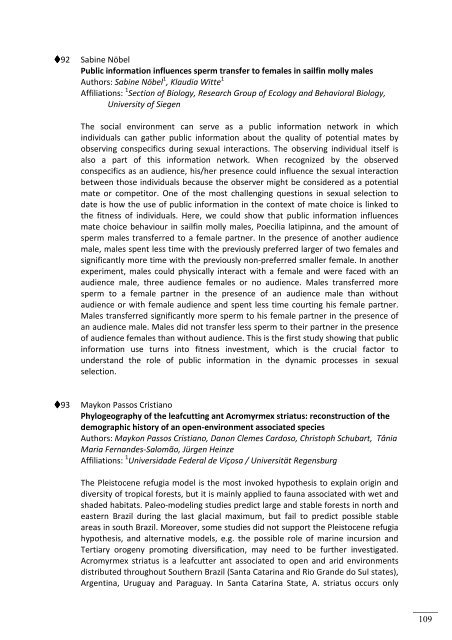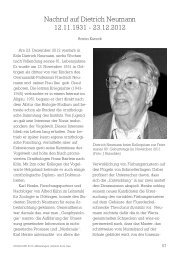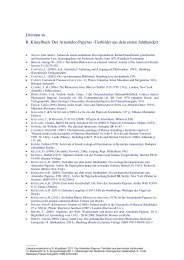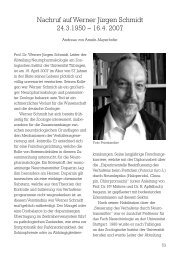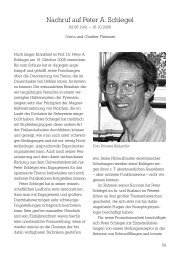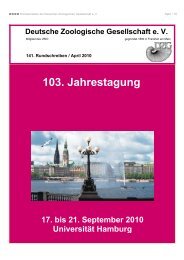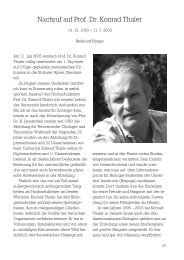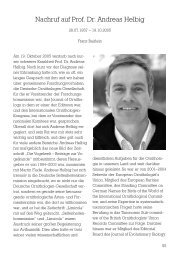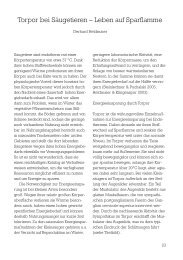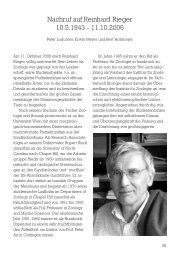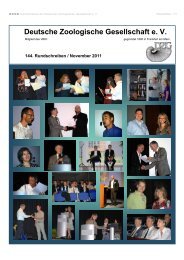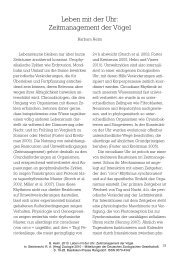2. Behavioral Biology TALKS - Deutsche Zoologische Gesellschaft
2. Behavioral Biology TALKS - Deutsche Zoologische Gesellschaft
2. Behavioral Biology TALKS - Deutsche Zoologische Gesellschaft
You also want an ePaper? Increase the reach of your titles
YUMPU automatically turns print PDFs into web optimized ePapers that Google loves.
����92 Sabine Nöbel<br />
Public information influences sperm transfer to females in sailfin molly males<br />
Authors: Sabine Nöbel 1 , Klaudia Witte 1<br />
Affiliations: 1 Section of <strong>Biology</strong>, Research Group of Ecology and <strong>Behavioral</strong> <strong>Biology</strong>,<br />
University of Siegen<br />
The social environment can serve as a public information network in which<br />
individuals can gather public information about the quality of potential mates by<br />
observing conspecifics during sexual interactions. The observing individual itself is<br />
also a part of this information network. When recognized by the observed<br />
conspecifics as an audience, his/her presence could influence the sexual interaction<br />
between those individuals because the observer might be considered as a potential<br />
mate or competitor. One of the most challenging questions in sexual selection to<br />
date is how the use of public information in the context of mate choice is linked to<br />
the fitness of individuals. Here, we could show that public information influences<br />
mate choice behaviour in sailfin molly males, Poecilia latipinna, and the amount of<br />
sperm males transferred to a female partner. In the presence of another audience<br />
male, males spent less time with the previously preferred larger of two females and<br />
significantly more time with the previously non-preferred smaller female. In another<br />
experiment, males could physically interact with a female and were faced with an<br />
audience male, three audience females or no audience. Males transferred more<br />
sperm to a female partner in the presence of an audience male than without<br />
audience or with female audience and spent less time courting his female partner.<br />
Males transferred significantly more sperm to his female partner in the presence of<br />
an audience male. Males did not transfer less sperm to their partner in the presence<br />
of audience females than without audience. This is the first study showing that public<br />
information use turns into fitness investment, which is the crucial factor to<br />
understand the role of public information in the dynamic processes in sexual<br />
selection.<br />
����93 Maykon Passos Cristiano<br />
Phylogeography of the leafcutting ant Acromyrmex striatus: reconstruction of the<br />
demographic history of an open-environment associated species<br />
Authors: Maykon Passos Cristiano, Danon Clemes Cardoso, Christoph Schubart, Tânia<br />
Maria Fernandes-Salomão, Jürgen Heinze<br />
Affiliations: 1 Universidade Federal de Viçosa / Universität Regensburg<br />
The Pleistocene refugia model is the most invoked hypothesis to explain origin and<br />
diversity of tropical forests, but it is mainly applied to fauna associated with wet and<br />
shaded habitats. Paleo-modeling studies predict large and stable forests in north and<br />
eastern Brazil during the last glacial maximum, but fail to predict possible stable<br />
areas in south Brazil. Moreover, some studies did not support the Pleistocene refugia<br />
hypothesis, and alternative models, e.g. the possible role of marine incursion and<br />
Tertiary orogeny promoting diversification, may need to be further investigated.<br />
Acromyrmex striatus is a leafcutter ant associated to open and arid environments<br />
distributed throughout Southern Brazil (Santa Catarina and Rio Grande do Sul states),<br />
Argentina, Uruguay and Paraguay. In Santa Catarina State, A. striatus occurs only<br />
109


